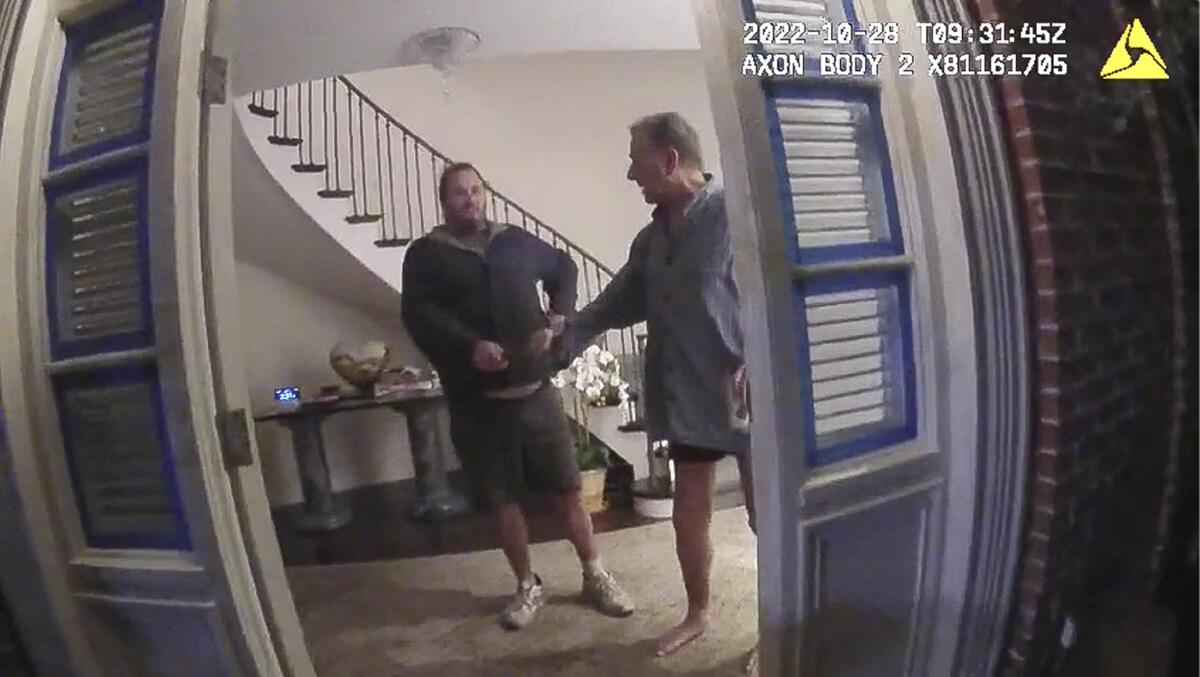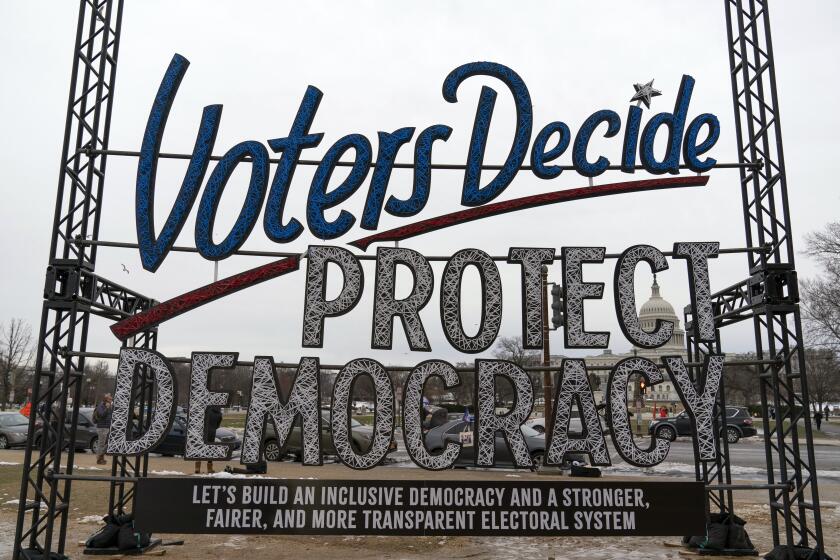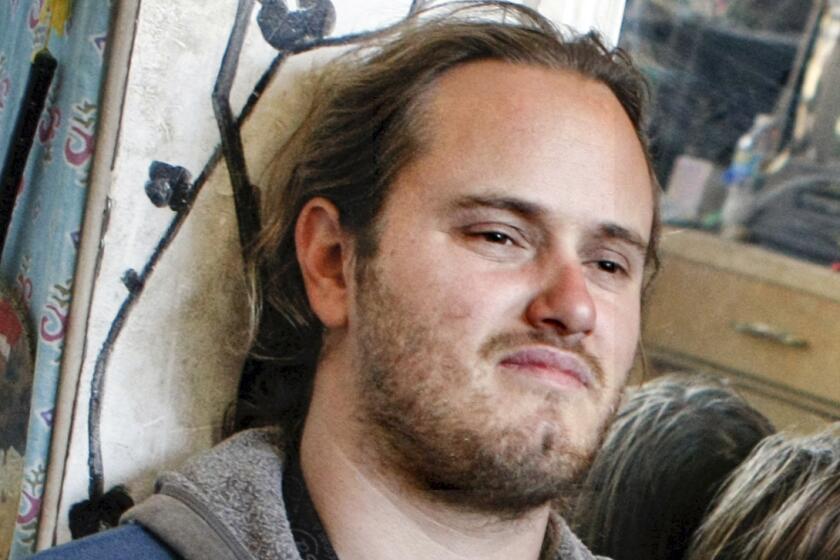Column: Pedophile panic and coming political violence. What the Paul Pelosi case revealed

A unicorn costume, a hammer and a belief that pedophiles are using public schools to destroy democracy: The trial of David DePape for attacking Paul Pelosi was strange and disturbing.
But take away the costume and the hammer, and the reasoning for DePape’s vicious attack is alarmingly mainstream — pedophile panic.
By that, I mean the outrageous effort not just by hate-mongering conspiracy theorists to frame LGBTQ+ individuals as deviant and dangerous, lumping them in with criminals who sexually abuse children. But also a cynical bid by some politicians, clergy and grifters to do the same.
Anti-LGBTQ+ attacks are everywhere, both physical and political. Hysteria about pedophiles, driven by conspiracy theories, has trampled truth.
As DePape explained it on the stand, he is concerned about “groomer schools,” where teachers are “queering the students, pushing transgenderism to confuse children about their identities to make them more vulnerable to abuse and Marxist indoctrination.”
Sound familiar? It could have been a quote from a Huntington Beach City Council meeting, a Republican presidential rally or a debate on the floor of the Florida Legislature, where the controversial “don’t say gay” bill last year was described by an aide to Gov. Ron DeSantis as an “anti-grooming” law.
The quote is, in fact, DePape’s summary of what he learned from right-wing podcaster James Lindsay about one of DePape’s top targets, a professor of feminist theory and queer studies whose house seemed, to DePape, too difficult to break into. So he went to Pelosi’s brick mansion instead.
Experts on extremism fear that the threat of politically motivated violence will intensify as the 2024 presidential campaign heats up.
When a San Francisco jury came back with a guilty verdict against DePape, it was hardly a bombshell. It is fact that DePape smashed a hammer into Pelosi’s skull, a brutal act caught on camera and uncontested even by his own lawyers.
What was lost with the quickness of the in-an-out, no-surprises trial — and what should be chilling to any supporter of civil rights — was the defense team’s argument about why DePape created his elaborate plot, which was going to involve donning the unicorn costume while interrogating the victim’s wife, Rep. Nancy Pelosi, about government corruption, and, you guessed it, pedophiles.
It wasn’t conventional politics. It wasn’t even aimed at Nancy Pelosi. The powerful San Francisco Democrat was somewhere down a list that included the mother of DePape’s two sons, Tom Hanks, George Soros, Hunter Biden and performance artist Marina Abramovic.
DePape was propelled by the hyper-drive conspiracies that have bled out from internet chat rooms onto streets and into school boards — amped-up paranoia about threats not just to the white Christian values that some perceive as intrinsic to our country’s identity, but to the safety of our children.
“It’s not just that she’s a pedo-activist. It’s that she wants to turn all the schools into pedophile molestation factories,” DePape said of the queer studies professor he was targeting.
“She wants to destroy children’s sense of identity because it’s her opinion that this will lead them to grow up dysfunctional and unhappy. And if they’re dysfunctional and unhappy, they will be maladjusted to society, hate society, and want to become communist activists,” he said.
Those kind of beliefs, ugly and untrue, can no longer be considered extreme, or extremism.
Take, for example, this commentary from earlier this year by Jonathan Butcher, a fellow at the ultraconservative and ultra-influential Heritage Foundation:
“For parents, rejecting radical gender theory is a matter of protecting their children. The rest of us, though, should reject queer theory’s attempt to gain control of the next generation,” he wrote.
Or the mugshot meme Donald Trump posted not too long ago insinuating that pedophiles were out to get him.
Or Trump’s recent sit-down interview with conservative activists Moms for America, in which he lamented that the “indoctrination programs” at public schools are “out of control” and promised quickly to end them if elected.
Jared Dmello, an expert on extremism and an incoming senior lecturer at University of Adelaide in Australia, told me that mainstream politics is “driving an anti-LGBTQ ideology.”
Where once conspiracy was relegated to dark corners, it now has a symbiotic relationship with the mainstream, he said, each building off whatever “evidence” or current events play into the narrative with such speed and force that the sheer amount of information makes it seem like it must be true.
“The whole goal is to introduce so much chaos into the atmosphere that it’s hard to distinguish what is fact from fiction,” he said.
Many of Q’s story lines, including evil lizard aliens and a cabal of pedophiles, are pulled from films and television shows. Screenwriters are not happy.
Mission accomplished.
A recent Public Religion Research Institute (PRRI) poll on threats to American democracy found 59% of Republicans think that what children are learning in school is a critical issue facing the United States. A 2022 poll by USC found that while roughly 60% of Democrats support teaching high school students about gender identity, gay and transgender rights or sexual orientation, only about 30% of Republicans feel the same.
Of course, parents have good reasons to be concerned about public schools, especially in the wake of the pandemic when teachers are burned out, budgets are tight and students are coping with sky-high levels of mental health challenges.
But Joan Donovan, an expert in disinformation and a professor at Boston University, told me that while violence remains rare, vigilantes such DePape aren’t the lone wolves we like to believe. She said violence, whether by individuals or groups, is going to increase as the 2024 election nears.
“I wish it were the case that they were fringe, but they do seem to represent a larger sentiment online,” she said. “Of course taking action in the form of assaulting or attempting to murder people is in and of itself horrendous, but if you look at the kind of discourse that emboldens these people, it’s the natural outcome.”
Support for political violence has increased over the past two years, with nearly a quarter of Americans now agreeing that “because things have gotten so far off track, true American patriots may have to resort to violence in order to save our country.” That comes from the recent PRRI poll on threats to American democracy.
That percentage has increased from 15% in 2021.
But get ready for it: 41% of Republicans who like Trump agreed violence may be necessary, and 46% of Trump supporters who believe the election was stolen also believe violence may be an answer. That’s nearly half.
By all accounts, DePape was just a lonesome loser, unremarkable and peaceful, until he started delving into conspiracy theories during the pandemic. Living in a Bay Area garage that didn’t even have a bathroom, he spent his free time — hours every day — playing video games while listening to conspiracy podcasters pushing what we were then calling QAnon.
David DePape, 42, has been arrested in connection with a violent attack on U.S. House Speaker Nancy Pelosi’s husband, Paul Pelosi.
I won’t go so far as to say he was a victim, but he was a vessel for a fire hose flow of propaganda, holding it all in until doing nothing seemed unconscionable. He is accountable for his violence, but it is clear he has lost the ability to parse truth from that swamp of what he calls research.
Somewhere along his journey, DePape began believing that a secret cabal of so-called elites was ruling the world and participating in a cult that sexually abused children.
That’s how DePape came up with his list of targets — most of those on it are somewhere in QAnon lore — a set of conspiracies that QAnon expert and Michigan State University professor Laura Dilley told me “absolutely are endemic now.”
At its core, the political turmoil caused by these falsehoods is not much different from the satanic panic that ruled in the 1980s, driven by discomfort with more women joining the workforce and leaving their children in day care. Then, too, conservatives vilified the LGBTQ+ community to fuel fear that children were in danger and American society was on the brink of collapse.
And Donovan points out that even the KKK focused on children and education in the 1920s, with the same arguments about American values.
So none of this is new.
But we are capable of not repeating the past. Hate and conspiracy aren’t normal. They aren’t American values, to be debated as valid political positions.
David DePape was fighting an enemy conjured by lies. That enemy may not be real, but the danger of those lies is.
More to Read
Sign up for Essential California
The most important California stories and recommendations in your inbox every morning.
You may occasionally receive promotional content from the Los Angeles Times.














